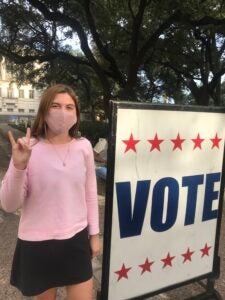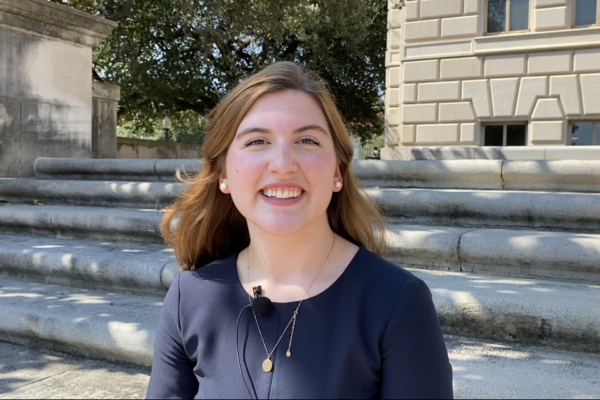What does it mean to be a Longhorn student? Soren Ettinger DeCou is a good example. Her range of interests is as wide as UT’s offerings. She takes full advantage of those offerings. And she has a passion for public service and improving the world.
Soren is a Plan II senior studying biomedical engineering and Mandarin and spends many of her waking hours at UT’s Clements Center for National Security. At first glance, those are wildly different interests, but a closer look reveals the connections and the synergy that distinguishes a research university like UT.
Even in high school, Soren was something of a polymath, interested in science and mathematics but also in foreign languages and current events. She attended high school in Missouri City, outside of Houston, and as she approached graduation decided to pursue engineering.
Soren considered a lot of top colleges, but it was the Texas Exes’ Forty Acres Scholars Program (FASP) that kept her in Texas. That academically elite, full-ride scholarship program brings her cohort of 20 students together every week for social activities and professional-development opportunities. The tight-knit group takes on service projects, mentors incoming scholars, represents the university at events, and even has traveled together to Belize.
She says that during the recruitment phase, the Texas Exes “did an amazing job at painting us a picture of a future built at UT. The program brought us to campus as high school seniors and facilitated meetings with our deans and tours of the colleges or schools to which we had applied. Now, I can’t imagine any other college experience. It’s like I’m in a waking dream because of the opportunities the Forty Acres Scholarship Program gives me.
“I didn’t expect Texas to be as much of a home as it is, to be the community where I figured out who I am and who I want to be.”
But Soren wasn’t satisfied sticking to engineering during her time on campus. “I wanted a way to study engineering and explore the humanities, and I found an incredible way to do that — the Plan II Honors program. Plan II Honors is intended, in most cases, to combine with a different major. You take your interest in intellectual inquiry, and humanities and liberal arts, and combine it with something else you’re passionate about. For me it was life science and technology,” she says.
Her favorite course so far has been “Transport Phenomena in Living Systems,” taught by Kenneth Diller, a founding member of the biomedical engineering department. “When I started Dr. Diller’s course, I was incredibly intimidated,” she says, recalling it combined rigorous knowledge of life sciences with the physiology of how the human body works — along with heat transfer, fluid flow, physics and mechanics concepts. “I just could not fathom how I was going to do well in that class.”
What she learned was a system for solving problems, what Diller calls the Generate Ideas Method. “You start with initial observations, you move through systematic steps, and you finish by coming up with a solution. All along the way you reference core scientific understandings, such as the conservation of energy, and you move through the process until you’re able to present rigorous solutions to difficult scientific problems.
“It was so difficult, but it was fantastic,” says Soren. “It was the most I’ve ever learned about problem solving. He created an environment that focuses on creative exploration but also imparted a rigorous understanding of the science of how our bodies work. Now I understand things like the mechanism of how blood flows through the body and how heat diffuses through tissue.”
But what she learned went far beyond that subject. “What I got from that class is that I should not be fearful of solving problems, and I should instead try to approach them systematically, because if I do that, and I pay attention to the details, then I can come up with an innovative solution.”
In addition to science and engineering courses, Soren discovered her passion for policy and foreign affairs at UT. In her sophomore year, she got involved in the Clements Center for National Security’s Undergraduate Fellows program. Now, as a Senior Undergraduate Fellow, Soren has had the chance to explore topics like U.S.-China relations, counterterrorism, emerging technology and nonproliferation. She has also had the opportunity to conduct research on civilian-military relations and lead policy council-style discussions on topics like biodefense, pandemics, China and Afghanistan. Most importantly, she says, “I’ve discovered how I can apply my academic background in service to our nation’s strategic priorities. The Clements Center empowers UT students to dream big and think critically about history, strategy and statecraft. I’ve met my closest friends and biggest mentors here at the Clements Center.”
Soren’s involvement beyond the classroom is she gets to put her passion for public service into practice. While at UT, she served as a cultural affairs intern for U.S. Embassy Beijing. “I wrote and spoke about American culture, history and democratic institutions. I tried to communicate American cultural tenets to young Chinese audiences,” she says. Her favorite project was a video she filmed and produced on UT campus. In Mandarin and in English, she described how America’s democratic system empowers its citizens and allows them to speak up and act on what they believe in, and how impactful voting in her first presidential election was to her. The U.S. embassy disseminated it through social media, and it was viewed thousands of times. Last summer, she completed the State Department’s Critical Language Scholarship for Mandarin.
It's like I'm in a waking dream ...

Civic engagement is also important to her. She says, “We have to engage young people in their state and local governments and help them understand how to advocate for their community’s needs. That starts with education, and specifically it starts with education on government and civics.” Soren participated in a program named Generation Citizen, in which her title was “democracy coach.”
She and a partner went to an Austin middle school and taught civics in a history classroom with a teacher. “Yes, it was the boring mechanics of how government works and how you can get engaged in it, but we also tried to lead them toward very specific things they could do to make changes.
The cool thing was, because it was a peer-to-peer mentorship program, we got to move to topics beyond government and civics that were equally impactful. We had really good conversations around financing your college, for instance. Some of them didn’t even know there were scholarships they could apply for.”
Coming to college in Austin had another advantage: it allowed her to intern at the Texas Legislature, where she supported the work of the House Committee on Public Education.
All of this seems a far cry from biomedical engineering, so how do these interests intersect in one person? “I hope to always be a deeply interdisciplinary and curious person. My passion — and the through-line of what I want to do — is public service. Our nation needs public servants with a diversity of backgrounds, and I aspire to contribute to that need.”
As for how her interests in science and policy might come together after graduation, she says, “Throughout my time at UT, I have learned that STEM majors are underrepresented in government. UT has helped me understand how I can use my technical education to make better policy. After I complete my degrees, I am committed to pursuing a career in public service. I’m excited to take what I learned on campus and use to make an impact on the world.”
Soren seems well on her way to a life of service, one enabled by the teachers, staff and fellow students she met at UT.




